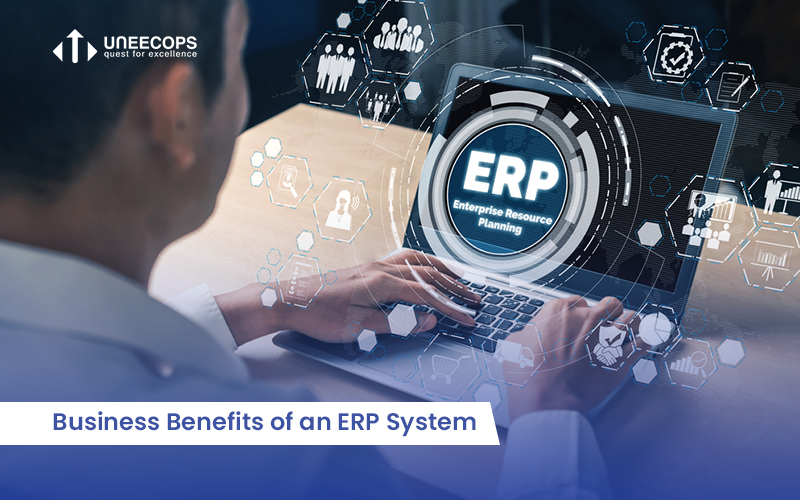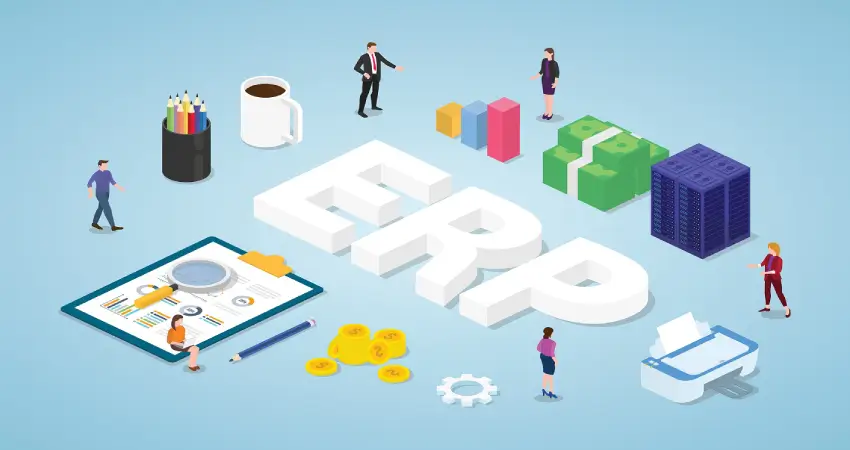There are a number of technologies available for modern businesses. Some businesses choose technology A ,while some choose technology B. However, there is one business technology that all forward-thinking businesses use or plan to use- without any exception. And that is ERP or Enterprise Resource Planning. 96% of the best in class businesses, and overall, 81% of businesses have opted for or are in the process of opting for an ERP. Thus, implementing an ERP system is not a matter of why anymore. It is a matter of when.

Let us find out the business benefits of an ERP system that are driving forward-thinking businesses to implement one.
1. An ERP System Unifies the Entire Organisation
Aberdeen’s research reveals that 83% of systems in an organisation don’t have the capability to ‘talk’ to each other. The main reason behind this is that the business fails to integrate data so that once the integration is done it can be used by any department. As a result, the flow of data or information remains stifled.
An ERP system eliminates this data flow bottleneck. In an ERP system, you have to enter your business data once, and then the entire organisation can use the same data. So, for example, once you enter your item master data in the system, both the sales and purchasing departments can use the same data to sell and purchase.
The result? – Less back and forth between departments. No multiple data entry. Above all, the leadership gets a bird’s eye view of every transaction, every business activity.
2. ERP Helps Businesses Track Business Processes
Lack of proper information flow results in blind spots as far as monitoring the processes is concerned. With an ERP, businesses can keep track of sales, purchases and inventory from a single centralised ERP platform. Managing finances becomes easy. Above all, with reports on pending A/R and A/P, you can efficiently keep track of the cash flow.
3. Real-time Tracking
Not just tracking, ERP enables businesses to monitor the operations on a real-time basis. For example, as soon as the business sells an item, the inventory level gets updated immediately. So, you will keep on seeing the latest information on your business in the ERP system.
4. Tracking of the Processes from Anywhere
Earlier, ERP meant a monolithic, centralised system installed on the company premises. To access it, you had to be in the boiler room- the company office. This meant that the field agent could not leverage the system. That kind of system could not have supported the modern work-from-anywhere paradigm.
Today, ERP systems are hosted on the cloud as SaaS software. That means, on the one hand, you don’t have to pay for expensive hardware to host the system. And, on the other hand, it is accessible from anywhere. Hence, anybody with permission can do all the back-office work without being present in the office. This is certainly one of the key benefits of an ERP system.
5. No Redundant Data Anymore
An enterprise that does not use an ERP will have to manually enter all the data on spreadsheets and Word doc. There are two problems in this practice. One, with so much manual data entry, it is obvious that some errors will creep up. But more than that, the enterprise will suffer from redundant data. For example, suppose a customer has changed her address. The sales team is aware of this new data. But the inventory and delivery team might not get the new data in time. This can potentially result in late delivery and poor customer service.
An ERP system eliminates this problem of redundant data. As said earlier, you just have to enter the master data once. So, when any part of the data needs to be changed, you just have to update the master data. Since the whole enterprise follows the same master data, all departments will be aware of the change in data.
6. Standardisation of the Back Office Processes
Among several benefits of an ERP system, this one is specifically true for small businesses and startups. When a business starts up, it does not have proper construction in place inside the office to manage every process in a wholesome way. The same happens for small businesses where, due to the lack of manpower, organisational efficiency remains out of reach.
An ERP system creates a construct within which the business operates. Every ERP system has a perfectly defined process that helps businesses to operate in an organised fashion. However, businesses should remember that there is a difference between creating a construct and boxing a business in. Quality ERP system like SAP Business One does not box a business- it lets you create your own construct.
7. Reduction in Operational Expenses
An ERP system eliminates the need of hiring more and more people. With ERP, you can automate your business process. Added to that, faster operations and increased operational excellence lead to increased sales and better customer service. All these ultimately lead to more revenue.
8. ERP Empowers Businesses to Make Data-Driven Decisions
Modern ERP systems do not just limit themselves to business management, but also provide you with intelligent insights on your business based on your business data. For example, an ERP can gauge an increase in demand for a particular product based on historical data.
All these benefits of an ERP system ultimately translate to increased profitability. An ERP ensures the best-in-class operational paradigm for your business. If you are still running your business without ERP, now is a good time to upgrade your business. Let your business spread its wings with SAP Business One and Uneecops as an SAP Business One implementation partner.







